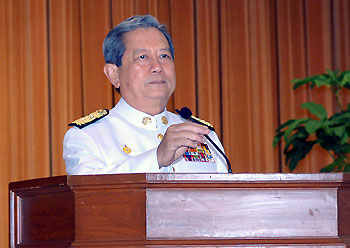
Thailand's new interim Prime Minister Surayud Chulanont
answers questions from journalists during his first press conference as PM in
Bangkok, Oct. 1, 2006. Surayud received on Sunday a royal command endorsing his
appointment as Thailand's 24th prime minister. -Xinhua
Retired general Surayud Chulanont on Sunday was sworn in as Thailand's 24th
Prime Minister, and he is to lead an interim government to run the country, 12
days after a military coup ousted former PM Thaksin Shinawatra and dismissed his
caretaker cabinet.
At a ceremony broadcast live nationwide on all Thai TV and radio stations
Sunday afternoon, Surayud received the royal command read out by Chairman of
Thailand's military ruling body Council for National Security (CNS) (formerly
called Council for Democratic Reform) Sonthi Boonyaratkalin, announcing the
retired general as Thailand's interim prime minister.
Surayud, born in August 1943 in Bangkok, previously served as a member of the
Privy House, top advisory body to Thai King Bhumibol Adulyadej. He was also
former Army Commander-in-Chief and then former Armed Forces Supreme-Commander of
Thailand before retiring from the military career in 2003.
Surayud promised to bring a fair and uncorrupted cabinet in his first press
conference as PM shortly after taking office on Sunday. It would take him about
one week to select his 35 cabinet members, the new interim premier said.
He also pledged to restore national unity as his first priority, to put an
end to the current political stalemate and the ongoing unrest in Thailand's deep
south -- the two pressing issues for the country within one year.
Surayud, 63, said that he agreed to take up the position only to solve the
nation's urgent problems though he had earlier vowed to stay out of politics.
On his economic policies, the interim premier said he would "focus on the
people's happiness rather than GDP figures".
Surayud, whose name in Thai means "courageous soldier," has gained experience
and reputation during his 38-year-long career as a professional military man. He
was widely acclaimed among the military as a capable commander in dealing with
insurgency and special warfares.
The official appointment of Surayud as PM came several hours after the issue
of the interim constitution, drafted by the Council for Democratic Reform (CDR)
and signed by the King. The interim PM will run the government under the interim
charter until a new constitution is drafted and submitted for royal endorsement,
after which a new general election could be held, hopefully in late 2007.
Under the interim charter, the CNS still holds significant powers over the
country's administration.
CNS Chairman Sonthi Boonyaratkalin retains the power in appointing and
removing the interim prime minister.
A 250-seat National Assembly selected from various sectors and appointed by
CNS will function as the Parliament, from which a council is further selected to
draft the new constitution to replace the 1997 Constitution that was annulled
after the coup.
Sonthi said on Sunday that the military council would not interfere in the
process of selecting cabinet members by the interim PM, but the CNS would help
administer the country before the new cabinet is formed.



